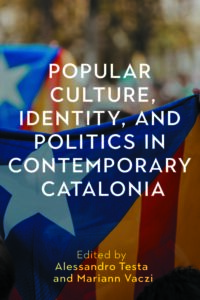Edited by Alessandro Testa and Mariann Vaczi
How does popular culture reflect and shape identity politics in the secessionist climate of contemporary Catalonia?
Since the turn of the twenty-first century, Catalonia has seen the rise of nationalist sentiments, moving from a desire for linguistic and cultural recognition to greater fiscal and economic autonomy to outright independence. Grounded in ethnographic research, this edited collection examines the intersections between grassroots culture, local identities, and the politics of catalanisme and independentisme from the end of the Francoist period to the present day. Through studies of various cultural manifestations including festivals, human tower-building, gastronomy, and bull-runs, chapters explore how civil mobilisation, women’s increasing participation in the public sphere, and issues of gentrification and heritagisation have intertwined with identity politics and nationalist trends. An important consideration is how a popular culture centred on sociability responded to the lockdowns and restrictions of the COVID-19 pandemic. More generally, the book reflects on the politicisation of culture and its role in nation-building, problematising such concepts as ‘inclusion’, integration’, ‘authenticity’, ‘belonging’, and ‘identity’.
ALESSANDRO TESTA is Associate Professor of Social and Historical Anthropology at the Faculty of Social Sciences, Charles University, Prague.
MARIANN VACZI is Assistant Professor of Basque Studies and Anthropology at the University of Nevada, Reno.
CONTRIBUTORS: Lluís Bellas, Camila del Mármol, Manuel Delgado, Mireia Guil, Venetia Johannes, Sarai Martín López, Romina Martínez Algueró, Dorothy Noyes, Xavier Roigé, Alessandro Testa, Mariann Vaczi.

